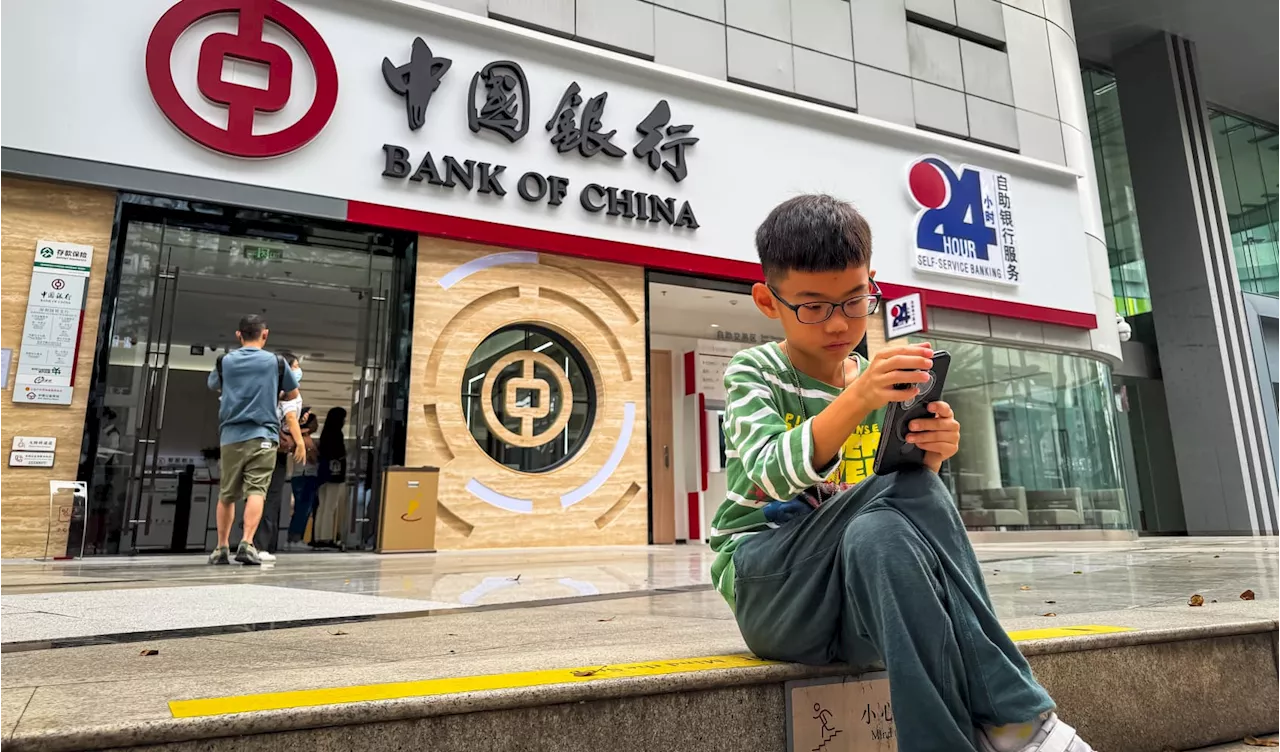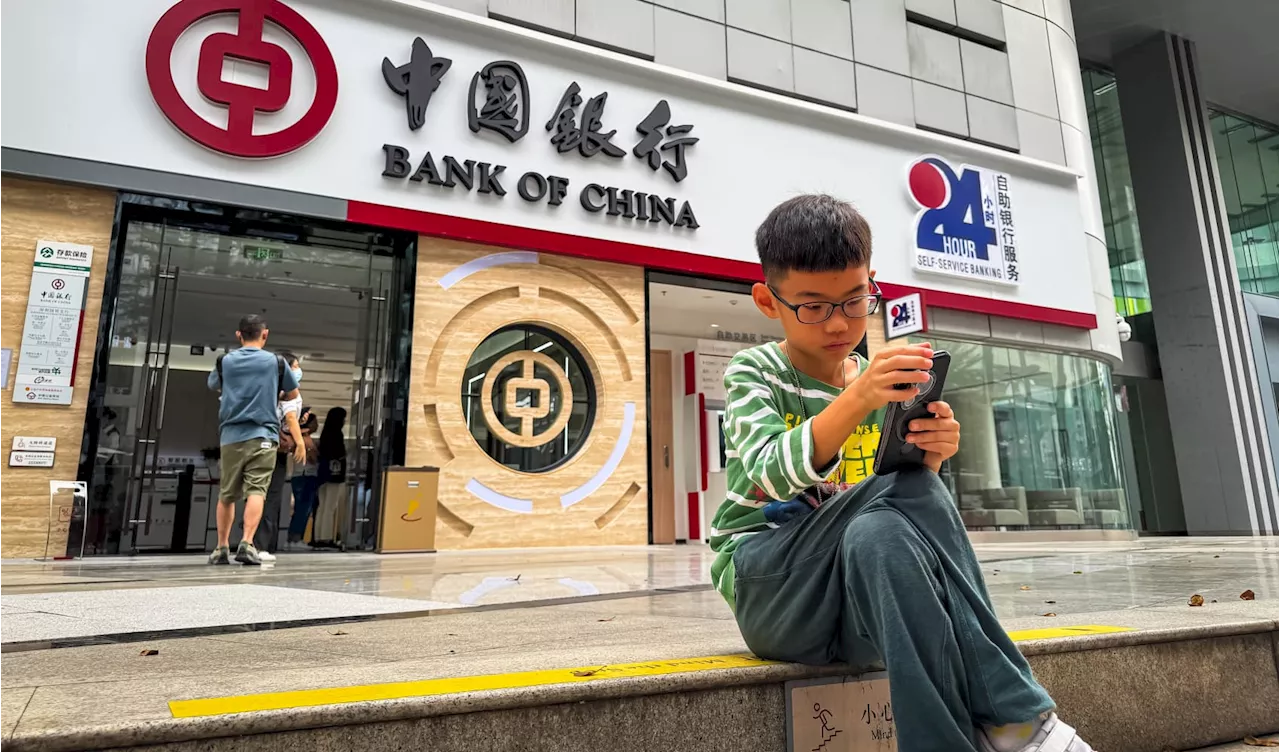Chinese commercial banks are increasingly investing in government bonds as Beijing's stimulus efforts have failed to ignite consumer loan demand. Slowing economic growth and weak consumer confidence are contributing to the trend.
Chinese commercial banks have flocked to buying government bonds as Beijing's stimulus push has failed to spur consumers loan demand. Total new yuan loans in the 11 months through to November 2024 fell over 20% to 17.1 trillion yuan ($2.33 trillion) from a year ago, according to data released by the People's Bank of China. Chinese sovereign bonds have seen a strong rally since December, with yields plunging to all-time lows this month.
With consumers and businesses gloomy about the prospects of the world's second-largest economy, loan growth has stalled. Beijing's stimulus push has so far not been able to spur consumer credit demand, and is yet to spark any meaningful rebound in the faltering economy. Chinese sovereign bonds have seen a strong rally since December, with 10-year yields plunging to all-time lows this month, dropping by about 34 basis points, according to LSEG data. 'The lack of strong consumer and business loan demand has led the capital flows into the sovereign bonds market,' said Edmund Goh, investment director of fixed income at abrdn in Singapore. That said,'the biggest problem onshore is a lack of assets to invest,' he added, as'there are no signs that China can get out of deflation at the moment.'Total new yuan loans in the 11 months through to November 2024 fell over 20% to 17.1 trillion yuan ($2.33 trillion) from a year ago,Loan demand has failed to pick up despite a sweeping stimulus measures that Chinese authorities started unveiling since last September, when the economy verged on missing its full-year growth target of'around 5%.' Goldman Sachs sees growth in the world's second-largest economy slowing to 4.5% this year, and expect credit demand in December to have slowed further from November. 'There is still a lack of quality borrowing demand as private enterprises remain cautious with approving new investments and households are also tightening purse strings,' said Lynn Song, chief economist at ING. For this year, authorities have vowed to make boosting consumption a top priority and to revive credit demand with lower corporate financing and household borrowing costs. Investors may continue to look for'sources of risk-free yield' this year due to the high level of uncertainty amid potential tariff action from abroad, Song said, noting'some question marks still remaining on how strong domestic policy support will be.'The slowdown in loans comes as mortgages, which used to fuel credit demand, are still in the stage of bottoming, said Andy Maynard, managing director and head of equities at China Renaissance. Chinese onshore investors have to contend with a lack of'investable asset to put money in, both in financial market and in physical market,' he added.Institutions are increasingly bullish on government bonds due to the belief that economic fundamentals will remain weak, coupled with fading hopes for a forceful policy push, said Zong Ke, portfolio manager at Shanghai-based asset manager Wequant. Ke said the current policy interventions are merely'efforts to prevent economic collapse and cushion against external shocks' and'simply to avoid a freefall.'The yield on the U.S. 10-year Treasury has been rising at a faster pace since June and a spike on Wednesday sent the yield to top 4.7%, The widening yield differentials between Chinese and U.S. sovereign bonds could risk encouraging capital outflows and put further pressure on the yuan that has been weakening against the greenback. Chinese onshore yuan hit a 16-month low against the dollar on Wednesday, while the offshore yuan has been on a multi-month slide since September. 'You have the perfect storm,' said Sam Radwan, founder of Enhance International, naming the lower government bond yields, prolonged real estate crisis and impacts from rising tariffs as risk factors, weighing on foreign investors' sentiment with onshore assets. While reducing the appeal of China bonds among foreign investors, the widened yield differentials with U.S. Treasuries has little impact on the performance of Chinese government bonds due to the'small share of foreign funds,' said Winson Phoon, head of fixed income research, Maybank Investment Banking Group.The falling yields offer a silver lining to Beijing — lower funding costs — as policymakers are expected to ramp up new bond issuance this year, said ING's Song. Beijing unveiled a $1.4 trillion debt swap program in November, aimed at easing local government financing crisis. 'For much of 2024, policymakers acted to intervene whenever the 10-year yields hit 2%,' Song said, noting that the PBOC had'quietly stopped intervention' in December. Investors are expecting the central bank to unveil fresh monetary easing steps this year, such as additional cuts to the main interest rate and the amount of cash that banks must hold as reserves. At the turn of the year, 'The bank will enrich and improve monetary policy toolkit, conduct buying and selling of treasury bonds and pay attention to moves in long-term yields,' according toEconomists at Standard Chartered Bank see the bond rally to continue this year but at a slower pace. The 10-year yield may fall to 1.40% at the end of 2025, they said in a note on Tuesday. Credit growth may stabilize by mid-year as stimulus policies start to lift certain sectors in the economy, the economists said, leading to a slower decline in bond yields
CHINA ECONOMY GOVERNMENT BONDS LOANS STIMULUS
United States Latest News, United States Headlines
Similar News:You can also read news stories similar to this one that we have collected from other news sources.
 Chinese Banks Flock to Government Bonds as Stimulus Fails to Spark Loan DemandDespite Beijing's economic stimulus efforts, consumer and business loan demand in China remains weak. This has led to a surge in Chinese banks buying government bonds, which have seen yields plunge to record lows. Economists attribute the lack of loan demand to pessimism about the Chinese economy and a shortage of investable assets. While the government is trying to stimulate credit demand and support economic growth, uncertainty about the effectiveness of its policies and external factors like rising tariffs are weighing on investor sentiment.
Chinese Banks Flock to Government Bonds as Stimulus Fails to Spark Loan DemandDespite Beijing's economic stimulus efforts, consumer and business loan demand in China remains weak. This has led to a surge in Chinese banks buying government bonds, which have seen yields plunge to record lows. Economists attribute the lack of loan demand to pessimism about the Chinese economy and a shortage of investable assets. While the government is trying to stimulate credit demand and support economic growth, uncertainty about the effectiveness of its policies and external factors like rising tariffs are weighing on investor sentiment.
Read more »
 Chinese Banks Flock to Government Bonds as Stimulus Falls FlatChinese banks are turning to government bonds as Beijing's stimulus efforts fail to boost consumer and business loan demand. Despite government efforts to revive the economy, loan growth has stalled, leading to a surge in bond purchases.
Chinese Banks Flock to Government Bonds as Stimulus Falls FlatChinese banks are turning to government bonds as Beijing's stimulus efforts fail to boost consumer and business loan demand. Despite government efforts to revive the economy, loan growth has stalled, leading to a surge in bond purchases.
Read more »
 China's Banks Flock to Government Bonds as Stimulus Fails to Spark Loan DemandChinese commercial banks are increasingly buying government bonds as Beijing's stimulus efforts haven't been successful in boosting consumer or business loan demand. New yuan loans have dropped over 20% in the first 11 months of 2024, leading to a rally in Chinese sovereign bonds with yields hitting all-time lows. This trend is driven by economic uncertainty, muted investment, and cautious spending by consumers and businesses.
China's Banks Flock to Government Bonds as Stimulus Fails to Spark Loan DemandChinese commercial banks are increasingly buying government bonds as Beijing's stimulus efforts haven't been successful in boosting consumer or business loan demand. New yuan loans have dropped over 20% in the first 11 months of 2024, leading to a rally in Chinese sovereign bonds with yields hitting all-time lows. This trend is driven by economic uncertainty, muted investment, and cautious spending by consumers and businesses.
Read more »
 FLock.io Launches Mainnet on Base, Announces FLOCK Token Generation EventFLock.io, a private AI training platform, has officially launched its mainnet on Base. This launch coincides with the Token Generation Event (TGE) for its native token, FLOCK, which will incentivize and reward community participation in the FLock ecosystem. Users can earn FLOCK by engaging in decentralized AI training through the platform, accessible via FLock.io. These tokens will facilitate collaboration among data providers, training nodes, and compute providers within the ecosystem.
FLock.io Launches Mainnet on Base, Announces FLOCK Token Generation EventFLock.io, a private AI training platform, has officially launched its mainnet on Base. This launch coincides with the Token Generation Event (TGE) for its native token, FLOCK, which will incentivize and reward community participation in the FLock ecosystem. Users can earn FLOCK by engaging in decentralized AI training through the platform, accessible via FLock.io. These tokens will facilitate collaboration among data providers, training nodes, and compute providers within the ecosystem.
Read more »
 Banks Sued Over Zelle Fraud, Agency Alleges Banks Ignored Customer ComplaintsThe Consumer Financial Protection Bureau (CFPB) filed a lawsuit against Wells Fargo, JPMorgan Chase, Bank of America, and Early Warning Services (EWS), alleging that the banks failed to adequately protect customers from fraud on the Zelle peer-to-peer payments platform.
Banks Sued Over Zelle Fraud, Agency Alleges Banks Ignored Customer ComplaintsThe Consumer Financial Protection Bureau (CFPB) filed a lawsuit against Wells Fargo, JPMorgan Chase, Bank of America, and Early Warning Services (EWS), alleging that the banks failed to adequately protect customers from fraud on the Zelle peer-to-peer payments platform.
Read more »
 Chinese lenders have a massive challenge: They can't lend enoughChinese onshore banks and funds have flocked to government bonds amid a gloomy economic outlook as hopes for meaningful policy push fade.
Chinese lenders have a massive challenge: They can't lend enoughChinese onshore banks and funds have flocked to government bonds amid a gloomy economic outlook as hopes for meaningful policy push fade.
Read more »
